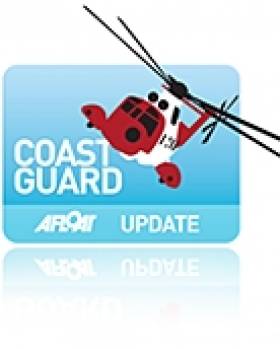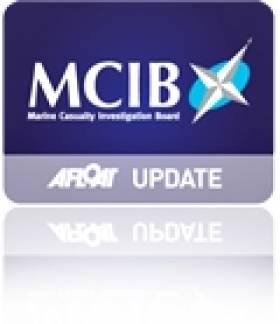Displaying items by tag: Tit Bonhomme
#Fishing - The daughter of the Tit Bonhomme's Irish skipper has joined those rejecting claims of widespread exploitation in the Irish fishing industry as revealed by the Guardian earlier the week.
Lia Ní Aodha, daughter of the late Michael Hayes and who is completing a PhD on the EU's Common Fisheries Policy at the University of Manchester, told The Irish Times in an open letter of her surprise at the allegations.
“It painted undocumented and abused as synonymous, it took the general conditions that go with a life at sea and painted them as exploitation, and it took tragedy at sea and painted it as easily avoidable,” she wrote.
In particular Ní Aodha criticised the Guardian's reference to the Tit Bonhomme tragedy, in which three Egyptian fisherman – Saled Mohamed Ibrahim Aly Eldin, Attia Shabaan and Wael Mohamed – died alongside her father and fellow Irish crew Kevin Kershaw. The Irish Times has more on the story HERE.
Ní Aodha's comments come days after an Egyptian fisherman was detained for failing to produce valid work documentation at the Tit Bonhomme's home port of Union Hall in West Cork.
Marine Minister Simon Coveney has since chaired the first meeting of the new cross-Government taskforce in response to the Guardian's allegations over human trafficking and safety breaches across the Irish prawn and whitefish fleet.
Water-Based Emergency Calls Will Go Directly To Coastguard
#Coastguard - All water-based emergency calls to 999 or 112 will be relayed directly to the Irish Coast Guard, as The Irish Times reports.
The new measure – first considered by then Transport Minister Leo Varadkar in July 2013 – comes in the wake of recommendations from the report on the Tit Bonhomme tragedy off West Cork in January 2012, which took the live of five fishermen.
It was found that two mobile phones were used to call for help when the trawler's VHF radio failed, but the calls were handled by two separate centres with no co-ordination between them, and relayed separately to the coastguard and Gardaí.
The Irish Times has much more on the story HERE.
#TitBonhomme - RTÉ News reports that the families of two Egyptian fishermen who died in the Tit Bonhomme tragedy in West Cork three years ago last week settled their civil actions in the High Court.
Saled Mohamed Ibrahim Aly Eldin and Attia Shabaan were two of four Egyptian fishermen on the Union Hall fishing trawler that sank after running aground in rough seas near Adam's Rock at Glandore Harbour on 15 January 2012.
The incident took the lives of skipper Michael Hayes and fellow crew Kevin Kershaw, whose family settled an action in early 2013, and Wael Mohamed, whose family settled their own High Court action earlier this month.
The latter's brother Abdelbaky Mohamed was the only survivor, and gave testimony at the inquest into the incident in the summer of 2013, which returned verdicts of accidental death. RTÉ News has more on the story HERE.
Hayes' widow Caitlin Ní Aodha has since returned to the fishing industry and spoke to our own Tom McSweeney for his This Island Nation show in October last year.
Tit Bonhomme 999 Concerns Will Be Considered Says Varadkar
#TitBonhomme - Transport Minister Leo Varadkar says he will consider concerns over the handling of emergency calls relating to the Tit Bonhomme tragedy, as The Irish Times reports.
The minister commented after a meeting last week with the widow of the stricken boat's skipper Michael Hayes in Union Hall in West Cork.
Hayes and four of his five-man crew lost their lives when the trawler went down after striking rocks at the mouth of Glandore Harbour. The only survivor was Egyptian fisherman Abdelbaky Mohamed, who was able to swim to shore.
The recent inquest into the incident criticised the handling of 999 emergency calls from the fishing boat prior to its sinking, as it emerged that neither the Irish Coast Guard nor the Marine Casualty Investigation Board were aware that not one but two calls were made by crewman Kevin Kershaw.
It emerged during the inquest that the coastguard was only notified of the event on the second call, three minutes after the first.
Barrister Elizabeth O'Connel, who represented Hayes' widow Caitlín Uí Aodha at the inquest, described the dearth of details taken by the operator on the first call as "extraordinary".
Ireland's emergency call service, operated by BT Ireland from three locations, is currently under review by the Department of Communications.
The Irish Times has more on the story HERE.
Tit Bonhomme Inquest Criticises 999 Service
#TitBonhomme - The "extraordinary" lack of information solicited by the operator who took the first of two emergency calls from the sinking Tit Bonhomme has been taken to task at the inquest into the loss of the trawler's crew.
The Irish Times reports that it only emerged last week that two emergency calls were made from the vessel by its youngest crew member Kevin Kershaw, though the Irish Coast Guard and the Marine Casualty Investigation Board (MCIB) were previously aware of only one.
The first - and previously unreported - 999 call from Kershaw's mobile phone at 5.46am was transferred to Bandon Garda Station rather than to the coastguard. Barrister Elizabeth O'Connel, representing the widow of skipper Michael Hayes, described the dearth of details taken by the operator on that call as "extraordinary".
It was only on the second call placed three minutes later that the Irish Guard was notified of the incident by 5.53am.
The Department of Communications has since announced it will conduct a review of the 999 service provided by the Emergency Call Answering Service (Ecas), operated by BT Ireland from Ballyshannon, Navan and Dublin.
As previously reported on Afloat.ie, five fishermen lost their lives when the trawler Tit Bonhomme went down after striking rocks at the mouth of Glandore Harbour.
The only survivor, Abdelbaky Mohamed, gave testimony to the inquest two weeks ago of his last moments aboard the stricken vessel.
#TitBonhomme - The inquest into the Tit Bonhomme tragedy has heard testimony from the sole survivor of the incident that took the lives of five fishermen.
As The Irish Times reports, Abdelbaky Mohamed explained how he and three other crew had been asleep below deck their trawler hit Adam Island at the mouth of Glandore Harbour on the morning of 15 January 2012.
Mohamed said there was no 'big bang' when the vessel hit the rocks but it began taking on water very quickly has he, his brother Wael, Attia Shaban and Kevin Kershaw made their way to the bridge to join Saied Ali Eldin and skipper Michael Hayes.
The boat was rolling in heavy seas as Hayes handed out lifejackets to each crewmen which they then put on, he recalled, adding that conditions made it impossible for them to put on their immersion suits.
The Irish Independent has published a harrowing transcript of the crew's frantic calls to the emergency services as the Tit Bonhomme was assaulted by the waves and eventually capsized.
Mohamed said his lifejacket was ripped from his body by the force of the water crashing into the bridge, but he was able to grab onto it to reach the surface and swim towards the shore, where he was found by a search party two hours later.
Last month's report by the Marine Casualty Investigation Board (MCIB) found that crew fatigue was "the single overriding casual factor" that contributed to the tragedy, pointing out that the crew had less than five hours' sleep during their 40-hour fishing trip.
But Mohamed told the inquest that he had had sufficient rest at the time of the incident.
The Irish Times has more on the story HERE as the inquest continues.
The Department of Transport, Tourism & Sport has accepted all five recommendations from the MCIB report in the 2012 sinking of the Tit Bonhomme trawler published today.
The Irish Registered motor fishing vessel "MFV Tit Bonhomme" left Union Hall, Glandore, Co. Cork on Friday the 13th of January 2012 on a fishing trip with a crew of six. The vessel experienced some technical difficulties during the fishing trip and the Skipper decided to return to port. On its return to the port of Union Hall in the early morning of the 15th January 2012 the vessel stranded on Adam's Island at the entrance to Glandore Harbour. The vessel broke up with the loss of five of its six crew.
The full report is available to download as a 6mb PDF document here.
The recommendations serve to highlight the importance of adopting a rigorous safety culture at sea. All five recommendations have either been implemented or are in the process of being implemented.
The Department of Transport, Tourism & Sport has today published its response to the Marine Casualty Investigation Board (MCIB) report into the sinking of the Tit Bonhomme.
The purpose of an MCIB report is to investigate a marine incident, and to make recommendations to the Minister in order to prevent a recurrence. The MCIB's independence from the Department is enshrined in law.
The Department's response to the five safety recommendations contained in the report is as follows:
6.1 That the Minister for Transport, Tourism and Sport enforces the European Community (Workers on board sea-going fishing Vessels) (Organisation of Working Time) Regulations, 2003 (S.I.709 of 2003).
6.2 That the Minister for Transport, Tourism and Sport enforces the Merchant Shipping (Safety of Fishing Vessels) (15-24 Metres) (Regulations) S.I. No. 640 of 2007 in relation to musters and drills.
The Department introduced an updated fishing vessel logbook for Irish registered fishing vessels of 25 tons or upwards from the January 1st 2013. Use of the logbook is being enforced at vessel surveys and inspections addresses, generating a safety management culture on-board Irish registered fishing vessels.
6.3 That the Minister for Transport, Tourism and Sport considers amending the requirements to provide for the automatic change-over of electrical power supplies for the radio installation in the event of an emergency.
The cost of technology to provide an automatic switch-over is now available at a reasonable price to vessels. Reference to this technology is being included in the next revision of SI(2007) 640 and fishing vessels will be required to adopt the technology when they fall due for survey.
6.4 That the Minister for Transport, Tourism and Sport considers the possible fitting of Bridge Navigation Watchkeeping Alarm Systems (BNWAS) on-board fishing vessels.
The Department fully supports fitting vessels with these systems. BNWAS is already mandatory for cargo ships and passenger ships. An Bord Iascaigh Mhara is proposing to provide funding for the voluntary fitting of these systems, which are mainly relevant for fishing vessels greater than 15m length overall.
6.5 That the Minister for Transport, Tourism and Sport considers issuing a Marine Notice drawing Owners/Skippers attention to the necessity for Skippers encountering situations where the safety of the vessel and its crew are potentially put at risk to alert the appropriate shore authorities advising them of the situation and what assistance the vessel may require.
The Department will shortly issue a Marine Notice to address this recommendation.
Minister for Transport, Tourism & Sport Leo Varadkar said: "I want to extend my sympathies to families and friends of the deceased. We owe it to them and everyone using the sea to embrace a culture of safety at sea and ensure that similar incidents do not re-occur in the future. I also want to thank the MCIB for its thorough investigation."
Exclusive Footage of Tit Bonhomme Rescue on RTÉ
#MARITIME TV PROGRAMMES - Footage from the rescue of the only survivor of the Tit Bonhomme tragedy in West Cork last January will feature in the first of a new series of Ireland's Search and Rescue tomorrow evening on RTÉ One.
Abdul Mohammed, 43, survived the sinking of the trawler when it ran around in rough seas near Adam's Rock at Glandore Harbour, after he was able to reach the shore.
His brother Wael Mohammed (35) died along with skipper Michael Hayes (52), Saied Ali Edlin (26), Attea Shaban (26) and Kevin Kershaw (21) when the boat went down.
As the Southern Star reports, Mohammed will feature in Sunday's programme talking to presenter Claire Byrne about his struggle to survive the tragedy, while exclusive footage from the Irish Coast Guard's Rescue 117 helicopter, the Irish naval vessel LE Niamh and Naval Service divers shows the search for the missing fisherman in the wake of the incident - a first for Irish television.
The first episode of the six-part series will be broadcast this Sunday 18 November at 6.30pm on RTÉ One.
#TIT BONHOMME - President Michael D Higgins yesterday paid tribute to the five fishermen who lost their lives in the Tit Bonhomme tragedy in January this year, The Irish Times reports.
At a special ecumenical service in Union Hall, West Cork, the President expressed his "sincere sympathies to all who lost loved ones on 15 January this year".
He added: “Coping with and learning to live with loss is the great challenge you face but you can take heart from the fact that you have such strong communities around you at this difficult time."
President Higgins also praised the tireless search teams - including the Irish Coast Guard, Naval Service, Garda and volunteer divers - as well as the fishing community of Union Hall on Glandore Harbour, where the tragedy occurred.
As previously reported on Afloat.ie, the fishing trawler Tit Bonhomme ran aground in rough seas near Adam's Rock, at the mouth of the harbour, on Sunday 15 January.
Five of the six-person crew - Eldin, Hayes, Attea Shaban (26), Kevin Kershaw (21) and Wael Mohammed (35) - lost their lives when the boat went down.
Only 43-year-old Abdul Mohammed, the brother of Wael Mohammed, survived the sinking after he was able to reach the shore.
The Irish Times has more on the story HERE.
Body of Final Tit Bonhomme Crewmember Recovered
#NEWS UPDATE - The body of the last missing crewmember of the stricken Tit Bonhomme was recovered in Glandore Bay in West Cork on Friday, The Irish Times reports.
The remains of 23-year-old Egyptian national Saied Ali Edlin were discovered floating on the surface to the west of the bay off Long Point, almost a mile from the wreck site and close to a month after the tragedy occurred.
It also comes just two days after the body of skipper Michael Hayes was found close to the mouth of the harbour, as previously reported on Afloat.ie.
The fishing vessel Tit Bonhomme ran aground in rough seas near Adam's Rock, at the mouth of Glandore Harbour, on Sunday 15 January.
Five of the six-person crew - Eldin, Hayes, Attea Shaban (26), Kevin Kershaw (21) and Wael Mohammed (35) - lost their lives when the boat went down.
Only 43-year-old Abdul Mohammed, the brother of Wael Mohammed, survived the sinking after he was able to reach the shore.
"Some of those lost were Egyptian, some were Irish but if you fish the sea, you’re all part of the same family," commented harbour master John Minihane. "We’re all the same, we’re one fishing family and we brought them home.”
The Irish Times has more on the story HERE.




































































